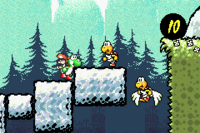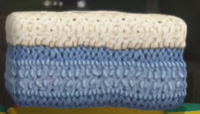Cascading Stone: Difference between revisions
(→Names in other languages: i keep not seeing these things. sorry for the string of edits.) |
|||
| Line 22: | Line 22: | ||
|Jap=おちるゆか | |Jap=おちるゆか | ||
|JapR=Ochiru Yuka | |JapR=Ochiru Yuka | ||
|JapM=Falling Floor | |JapM=Falling Floor | ||
|JapN=''Super Mario World 2: Yoshi's Island'' | |||
|Jap2=ゴゴゴいわ | |Jap2=ゴゴゴいわ | ||
|Jap2R=Gogogo Iwa | |Jap2R=Gogogo Iwa | ||
Latest revision as of 17:30, December 15, 2024
It has been requested that more images be uploaded for this article. Remove this notice only after the additional images have been added. Specific(s): Sliding Block-type and Yoshi's New Island appearance

Cascading Stones,[1] also described as falling stone blocks[2] or falling blocks,[3] are platforms of various shapes and sizes found in platform games of the Yoshi franchise. When stood upon by the player character, they fall down into the ground or off the screen.
History[edit]
Super Mario World 2: Yoshi's Island / Yoshi's Island: Super Mario Advance 3[edit]
Falling stone blocks first appear in Super Mario World 2: Yoshi's Island. They initially stand in mid-air, but if a Yoshi steps on one, it shakes and starts descending continuously. Depending on their positioning, they may either drop down into an abyss or crash onto ground and come to a stop. Yoshi loses a life if he is caught between a stone block and a platform. Falling stone blocks appear in Visit Koopa And Para-Koopa, Lakitu's Wall, and Shifting Platforms Ahead; in Yoshi's Island: Super Mario Advance 3, they additionally appear in Exercise in the Skies. The course Visit Koopa And Para-Koopa features a vertically-scrolling section with stone blocks that drop by themselves for above, requiring the Yoshi to navigate them and stay on top of the continually rising tower of blocks in order to progress.
Yoshi's Island DS[edit]
In Yoshi's Island DS, the typical Cascading Stones mainly appear in Rock 'n' Fall, though other behaviors appear elsewhere; some fall only when terrain under them is destroyed with an egg, while others stand on solid ground and can be raised with a switch. A type known as Sliding Blocks[4] appears in Tap-Tap's Sunken Cave and Teeth-Chattering Chill Zone.
Yoshi's New Island[edit]
Cascading Stones reappear in Yoshi's New Island as a feature of Koopa Canyon, where their falling behavior was slightly altered, as they shake before abruptly falling instead of a more gradual descent. Similar terrain appears in Crumble Rock Rumble.
Yoshi's Woolly World[edit]
In Yoshi's Woolly World, Cascading Stones are made out of yarn, and they appear in Lakitu Peekaboo.
Names in other languages[edit]
| Language | Name | Meaning | Notes |
|---|---|---|---|
| Japanese | おちるゆか[?] Ochiru Yuka |
Falling Floor | Super Mario World 2: Yoshi's Island |
| ゴゴゴいわ[?] Gogogo Iwa |
Rumbling Rock;「ゴゴゴ」(gogogo) is an onomatopoeic term for a rumbling or whirring object | Yoshi's Island DS | |
Rakka Burokku |
Drop Block; shared with an object from Wario World | Yoshi's New Island | |
| Italian | Roccia instabile[?] | Unstable rock; shared with Wobble Rock | Yoshi's Island DS |
| Roccione discendente[?] | Descending big rock | Yoshi's New Island |
Trivia[edit]
- During development of Super Mario World 2: Yoshi's Island, the stone was dubbed「テトリスブロック」(Tetorisu Burokku, Tetris Block).[6]
References[edit]
- ^ Black, Fletcher (December 19, 2006). Yoshi's Island DS PRIMA Official Game Guide. Prima Games (American English). ISBN 0-7615-5576-5. Page 201.
- ^ Williams, Drew (2002). Yoshi's Island: Super Mario Advance 3 Player's Guide. Nintendo of America (English). ISBN 1-930206-25-9. Page 38.
- ^ Williams, Drew (November 6, 2006). Yoshi's Island DS Player's Guide. Nintendo of America (English). ISBN 1-59812-016-6. Page 85.
- ^ Black, Fletcher (December 19, 2006). Yoshi's Island DS PRIMA Official Game Guide. Prima Games (American English). ISBN 0-7615-5576-5. Page 171.
- ^ 2013. 「任天堂公式ガイドブック ヨッシー New アイランド」 (Nintendo Kōshiki Guidebook – Yoshi's New Island). Shogakukan (Japanese). Page 70.
- ^ TCRF. Proto:Super Mario World 2: Yoshi's Island/ys romX 0 § World 2. The Cutting Room Floor. Retrieved December 11, 2021.
